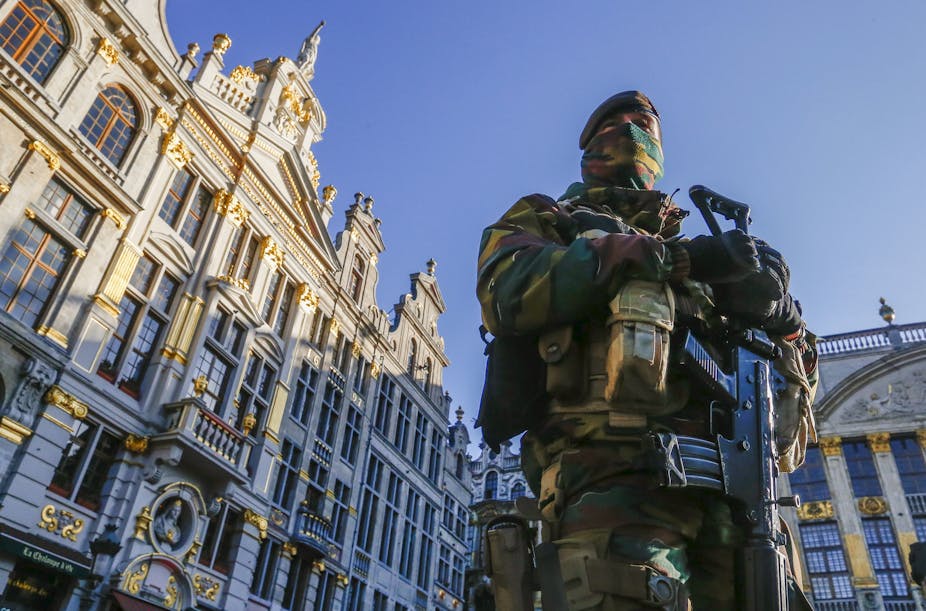When the entire neighbourhood of Saint-Denis, a town north of Paris, was cordoned off by the police, journalists’ cameras were kept at bay. Inside, French SWAT teams had surrounded terrorists hiding out after the attacks five days before.
No journalist was allowed to enter the exclusion zone around the building where the assault was taking place. The reason given? “Operational security”.
The police had simple objectives. To guarantee that no information could escape that might endanger the success of the operation. Ensure that no individuals or equipment were present that might negatively affect the security forces or the local population. Remove the need for police to ensure the safety of journalists. In short, eliminate everything that didn’t have a direct role in the mission at hand.

The cats of #BrusselsLockdown
The ethical debate over the presence of the media during police operations began after the Charlie Hebdo attacks in January. In France it is now accepted that the presence of the media and the dissemination of information can make a dangerous situation even riskier.
In this context, the widespread enthusiasm for sharing cat pictures on Twitter the night of November 22 and 23 – rather than information about ongoing security operations in Brussels – was revealing.
Few people challenged the information blackout, but Guillaume Auda, a reporter for I-Télé, did raise some concerns:
The 2.0 silence demanded by Belgian police – and respected – raises questions. Many cats, fewer sources, less info …
War comes home
When a war suddenly breaks out at home, rights that would seem to be self-evident no longer are, despite the fact that journalists have long covered distant conflicts in which their soldiers are engaged.
In January 2013, Operation Serval was launched on Malian territory. The longer the intervention lasted, the more the journalists on the ground become frustrated. The country’s geography and operating conditions made it difficult to cover the conflict without some support from the military.
However, the French army did precisely nothing (to put it mildly) to make the journalists’ jobs easier, and the early action took place far removed from the eyes of the media.
During military actions, the communication arm of the Army’s general staff is in charge of media policy. Its criteria are the same as those announced by higher authorities for the operations in Brussels or in Saint-Denis: guarantee the success of the operation, don’t jeopardise military security or civilian safety, avoid getting into a situation where you have to keep journalists safe.

Are all these rules justified? In part, they’re as valid in Saint-Denis as they are in Mali. The difference? When these rules are issued by the Army communications group, they will be discussed and any unstated motivations will be examined.
In response to the military’s position, some journalists can respond, in effect, by saying, “We are capable of understanding your rules and will take them into account. Therefore, you need give us access to the zone of operations.”
In Mali, journalists who tried to circumvent the rules were often praised for their boldness by their peers. This was particularly the case during an edition of French TV show Media Magazine, which lauded the work of Thomas Hofnung, then at Libération and now at The Conversation France, and Anne-Claire Coudray, then a reporter for TF1.
A week after the November 13 attacks in Paris, two programs examined how the media covered the events. The Confidentiality of Sources on France Culture on November 21, and Media Magazine again on November 22.
This time, the guests on the show agreed: the police restrictions on the diffusion of sensitive information were fair and reasonable. The appropriateness of showing images of dead bodies was discussed, as was the question of how certain words – “war”, “Islam”, and others – should be used. In the coming weeks, will the question of the lack of media access to the police operations be raised as well?
What’s good for Mali …
The difference between the media rebellion in Mali and the praise for journalists’ calm obedience in France is worthy of analysis.
Is there a parallel between the situation in northern Mali, in which journalists had little access early on, and the streets of Saint-Denis, where police roadblocks prevented all journalists from accessing the scene? If the police were right to do so, why was there a debate on the military’s choices in Mali? And what about the fact that the only available images from Saint-Denis were either from “official” channels or those from the general public put directly on social media while working journalists were denied all access?
If journalists consider the authorities’ instructions in Saint-Denis to be appropriate, do they also agree that it was right for them to have concealed what was going on? Or that there’s no interest in looking into anything that might have been suspect about the information revealed by the government and police? If so, why does the media give these rights to police and the Ministry of the Interior, but not the French Army and the Ministry of Defence?
All the frames of reference that journalists use to present information to the public, including those imposed upon them, are at issue here – they can give rise to trust, but also distrust of institutions. Politicians have established a continuum between distant countries and the home front in the war in which we are now fully engaged. Could this lead to a continuum of journalistic practices between external conflict zones, where French soldiers are involved, to the internal conflict zones, where the police are engaged?
Shifts in the debate about press access are certainly to be expected. It’s a safe bet that the way young journalists cover defence questions will not be the same after the attacks in France.
Translated from the French by Leighton Walter Kille.


